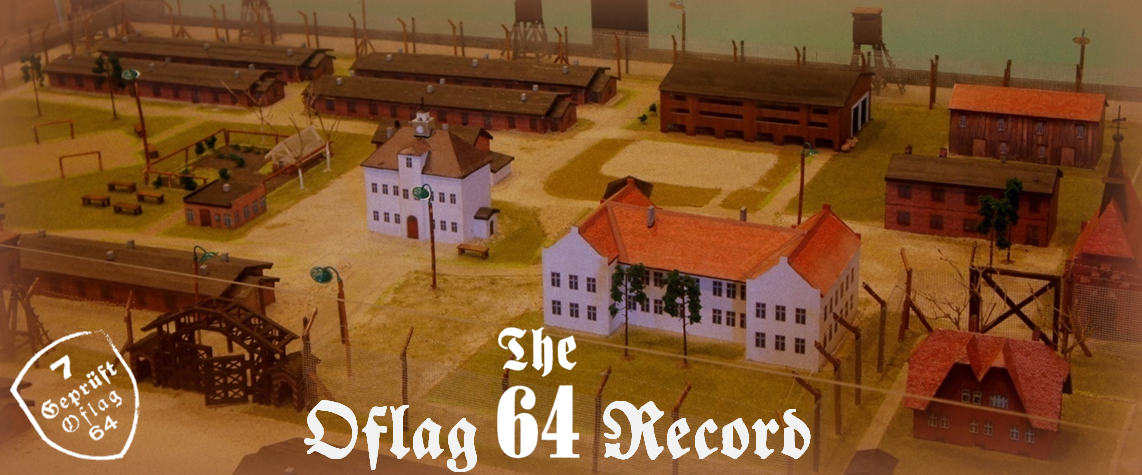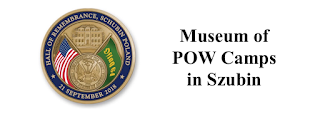"The most successful and spectacular activity in Oflag 64 was 'The Little Theater of Schubin College' shortly called 'The Little Theater'. The very creative theatrical group shared the wealth Broadway plays and presented to their brothers in arms their, quite often newly born and discovered, talents. POW’s produced a total of eight three-act plays, all of which were former Broadway hits, they also produced 7 one-act plays, 8 musical reviews and 1 original three-act play. In addition to these activities the scene of The Little Theater hosted the concerts of swing band and full philharmonic orchestra, glee club and choir, minstrels and occasional movies".
The first entertainment of The Little Theater Group took place on occasion of the Independence Day '43. Let's read how the birth of "The Little Theater" was recollected shortly after the war by one of its former actors, Lt. Larry Phelan. His memories were written down by Lt. Leo W. Fisher (also the POW in Oflag 64) just after his homecoming and published in series of articles entitled "Behind The Barbed Wire". The articles series were written exclusively for the Central Press.
"The Little Theater, I think, was the one of the best organizations, one of the most hopeful in the camp. Lt. Frank Maxwell, of Jersey City, NJ, was among the first to plan dramatic entertainments. He had once worked for Robert L. Ripley’s “Believe It or Not” show and had learned showmanship from him. On July 4, 1943, he produced a variety show, sans lights, stage or scenery. A poor substitute for real entertainment but it was a beginning and the good one. That night, despite a bitter irone of the barbned wire and watchful guards, the men celebrated Independence Day. Lt. Wilbur Sharpe, of Lebanon, Indiana, sang "This is Worth Fighting For!" and he meant it. A choir of 13 voices sang all of the old songs Americans love so well. The Listeners closed their eyes and for the moment they were home their loved ones close by… at peace. The program closed and the men applauded and went to bed singing. Morale skyrocketed, and 'The Little Theater' was born."
Three years ago I have asked Wilbur Sharpe to bring back the mood of this day from the past. He has agreed to perform once again the same song he sang 70 years ago during the celebration of the Independence Day '43 at Oflag 64. Below you can enjoy Bill's performance of "This Is Worth Fighting For!" accompanied by Dean Lawrence.
The Little Theater (timeline/repertoire/events):
4 July 1943 - “The Independence Day Celebration” produced and directed by Frank Maxwell:
- Song “This Is Worth Fighting For!” performed by Wilbur B Sharpe and Bob Rankin’ accompanying him on trumpet.
- Various songs performed by choir: Seymour Bolten, Harry Carlson, Jack Carpenter, Tony Cipriani, Craig Campbell, Jim Fraser, Howard Holder, Ken Johnson, Charley Jones, Frank Maxwell, Wilbur Sharpe, Stanley Stetson and Keith Willis.
- Skit “If Men Played Cards As Women Do” (written by George S. Kaufman, 1926), played Bill Farrell, John Cramer, Jim Koch and Harry Schultz.
The song "This Is Worth Fighting For!" is originally featured in the 1942 Universal musical directed by Charles Lamont "When Johnny Comes Marching Home" which starred Allan Jones and Jane Frazee. Below one can hear the excerpt from the movie including the song performed by the Phil Spitalny All-Girl Orchestra with Evelyn and Her Magic Violin, as well as, other versions of the songs by Jimmy’ego Dorsey, Vaughna Monroe or The Ink Spots.
Sources and acknowledgments:
- Report on Oflag 64. American Prisoners of War in Germany – prepared by Military Intelligence Service, War Department, 15 July 1944, p. 4.
- “Behind The Barbed Wire” – by Leo W. Fisher, available at www.oflag64.us
- Special thanks to Cynthia Burgess, daughter of Wilbur Sharpe, for preparing and recording her father's performance.
© Mariusz Winiecki










